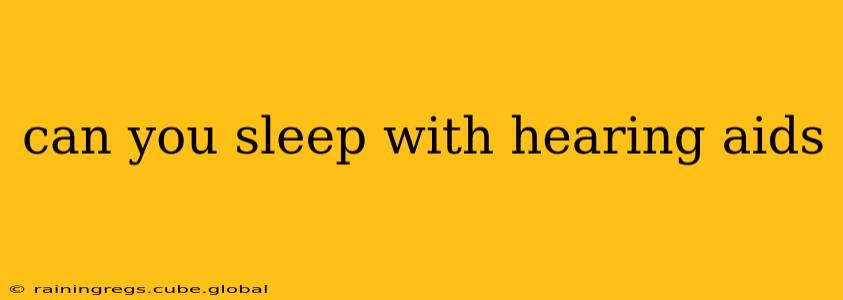Sleeping with hearing aids is a question many hearing aid users ponder. The answer isn't a simple yes or no; it depends on several factors, including the type of hearing aid you have, your sleeping habits, and your individual comfort level. This guide will explore the pros, cons, and considerations surrounding sleeping with your hearing aids.
What Type of Hearing Aid Do You Have?
The type of hearing aid significantly impacts whether sleeping with it is advisable. Different hearing aids offer varying levels of durability and water resistance.
-
Behind-the-Ear (BTE) Hearing Aids: Generally, these are more robust and less likely to be damaged by accidental pressure or moisture during sleep. However, they can still be uncomfortable for some.
-
In-the-Ear (ITE) and In-the-Canal (ITC) Hearing Aids: These are more delicate and susceptible to damage from pressure or moisture. They are generally not recommended for sleeping with.
-
Completely-in-Canal (CIC) and Invisible-in-Canal (IIC) Hearing Aids: These are the smallest and most fragile types, making them highly unsuitable for sleeping with. The risk of damage or loss is significantly increased.
Is it Safe to Sleep with Hearing Aids?
Safety is a primary concern. While some individuals might find sleeping with their BTE aids comfortable, potential risks exist:
-
Damage: Accidental pressure, tossing and turning, or even simply the weight of your head can damage delicate components.
-
Moisture: Earwax buildup, perspiration, and saliva can affect the functionality of your hearing aids, potentially leading to malfunctions or damage.
-
Infection: Introducing moisture and debris into the ear canal while you sleep can increase the risk of ear infections.
How Comfortable is Sleeping With Hearing Aids?
Comfort is subjective. Even with durable BTE aids, some individuals find them uncomfortable or irritating while sleeping. The size, weight, and positioning of the hearing aid can cause discomfort or pressure.
What are the Alternatives to Sleeping With Hearing Aids?
Fortunately, there are excellent alternatives if you're concerned about sleeping with your hearing aids:
-
Designated charging case: Many modern hearing aids offer convenient charging cases. You can remove your aids before sleep and place them in the case for charging overnight.
-
Night-time storage solution: If you don't have a charging case, a small, clean container is sufficient for storing them overnight. This protects them from damage and debris.
Can I Sleep With My Hearing Aids if I Have Certain Medical Conditions?
Individuals with certain medical conditions might find sleeping with hearing aids more problematic. If you have any concerns, it's crucial to consult with both your audiologist and your doctor.
What if I'm a Light Sleeper and Concerned About Missing Sounds?
For light sleepers worried about missing crucial sounds like alarms or emergency signals, consider these options:
-
Alarm clock with vibrating function: These offer a gentler wake-up and reduce reliance on hearing aids for audible alarms.
-
Door/window sensors: These provide alerts for security purposes.
-
Smoke detectors: Modern smoke detectors often incorporate high-intensity audible and visual alarms for safety.
Conclusion:
Whether or not you can sleep with hearing aids depends heavily on your specific situation. Prioritize the safety and longevity of your hearing aids. If you are uncertain, always consult your audiologist for personalized advice. Choosing the best option for you balances comfort, safety, and hearing aid preservation.
